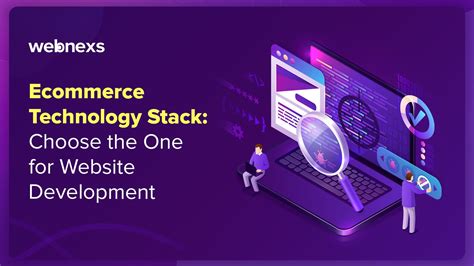In today's fast-paced digital landscape, having a robust ecommerce tech stack is crucial for online businesses to stay competitive, drive sales, and provide exceptional customer experiences. A well-designed tech stack can help ecommerce companies streamline their operations, improve efficiency, and scale their business for long-term success. In this article, we will delve into the importance of building a strong ecommerce tech stack, its key components, and provide insights on how to create a tailored tech stack that meets your business needs.
The Importance of a Strong Ecommerce Tech Stack
A strong ecommerce tech stack is the backbone of any online business, enabling companies to manage their operations, engage with customers, and drive revenue growth. A well-designed tech stack can help ecommerce businesses:
- Improve operational efficiency and reduce costs
- Enhance customer experiences and increase loyalty
- Increase sales and revenue growth
- Stay competitive in a rapidly evolving market
- Scale their business for long-term success
Key Components of a Strong Ecommerce Tech Stack
A robust ecommerce tech stack typically consists of several key components, including:
Ecommerce Platform

The ecommerce platform is the foundation of your tech stack, providing the infrastructure for your online store. Popular ecommerce platforms include Shopify, Magento, and WooCommerce. When selecting an ecommerce platform, consider factors such as scalability, customization options, and integrations with third-party apps.
Order Management System (OMS)
An OMS is a critical component of your tech stack, enabling you to manage orders, inventory, and shipping. A robust OMS can help you streamline your fulfillment process, reduce errors, and improve customer satisfaction. Popular OMS solutions include TradeGecko, Zoho Inventory, and Skubana.
Payment Gateway
A payment gateway is a secure online payment processing system that enables customers to make payments on your website. Popular payment gateways include PayPal, Stripe, and Authorize.net. When selecting a payment gateway, consider factors such as security, fees, and integrations with your ecommerce platform.
Customer Relationship Management (CRM) System
A CRM system is a powerful tool for managing customer interactions, tracking sales, and analyzing customer data. Popular CRM solutions include Salesforce, HubSpot, and Zoho CRM. A robust CRM system can help you personalize customer experiences, improve sales, and enhance customer loyalty.
Marketing Automation Platform
A marketing automation platform is a software solution that enables you to automate and optimize your marketing campaigns. Popular marketing automation platforms include Marketo, Pardot, and Klaviyo. A robust marketing automation platform can help you personalize customer experiences, improve engagement, and drive revenue growth.
Creating a Tailored Ecommerce Tech Stack
Creating a tailored ecommerce tech stack requires careful consideration of your business needs, goals, and budget. Here are some tips for building a customized tech stack:
- Assess your business needs: Identify your business goals, target audience, and operational requirements.
- Research and evaluate solutions: Research and evaluate different tech stack components, considering factors such as scalability, customization options, and integrations.
- Integrate with third-party apps: Integrate your ecommerce platform with third-party apps to enhance functionality and improve customer experiences.
- Monitor and optimize: Continuously monitor and optimize your tech stack to ensure it is aligned with your business needs and goals.
Gallery of Ecommerce Tech Stack






FAQ Section
What is an ecommerce tech stack?
+An ecommerce tech stack is a collection of software solutions and tools that enable online businesses to manage their operations, engage with customers, and drive revenue growth.
What are the key components of a strong ecommerce tech stack?
+The key components of a strong ecommerce tech stack include an ecommerce platform, order management system, payment gateway, customer relationship management system, and marketing automation platform.
How do I create a tailored ecommerce tech stack?
+Creating a tailored ecommerce tech stack requires careful consideration of your business needs, goals, and budget. Research and evaluate different tech stack components, integrate with third-party apps, and continuously monitor and optimize your tech stack.
In conclusion, building a strong ecommerce tech stack is crucial for online businesses to stay competitive, drive sales, and provide exceptional customer experiences. By understanding the importance of a robust tech stack, identifying key components, and creating a tailored tech stack, ecommerce companies can streamline their operations, improve efficiency, and scale their business for long-term success.
